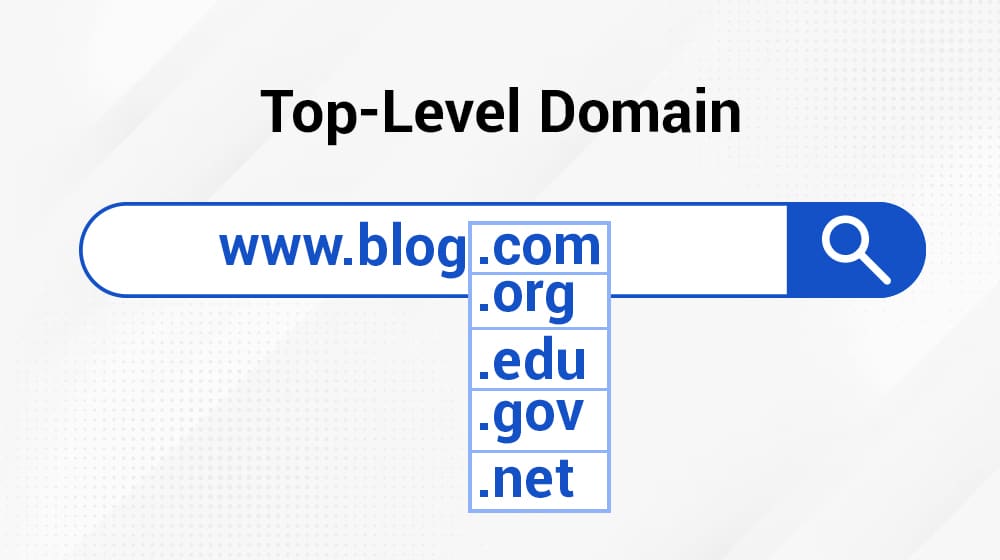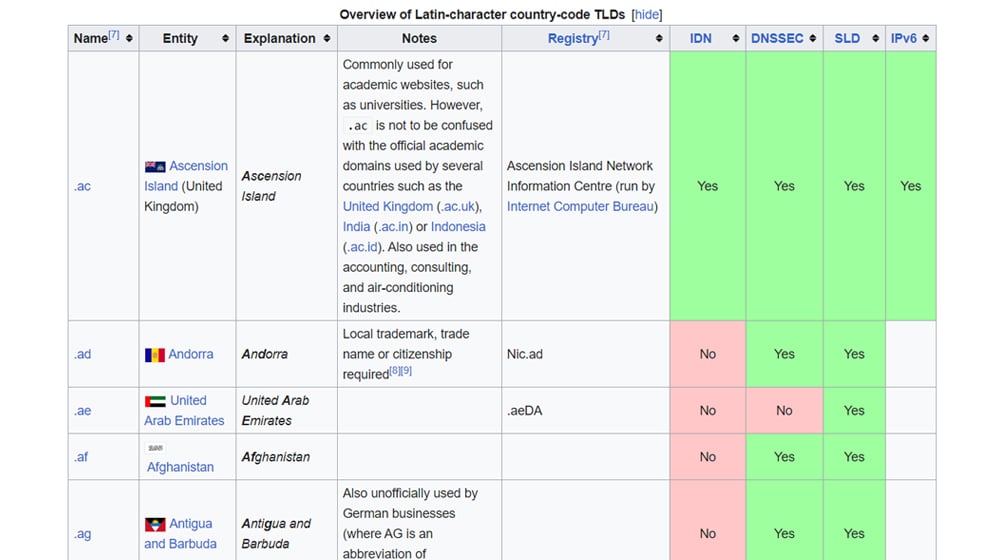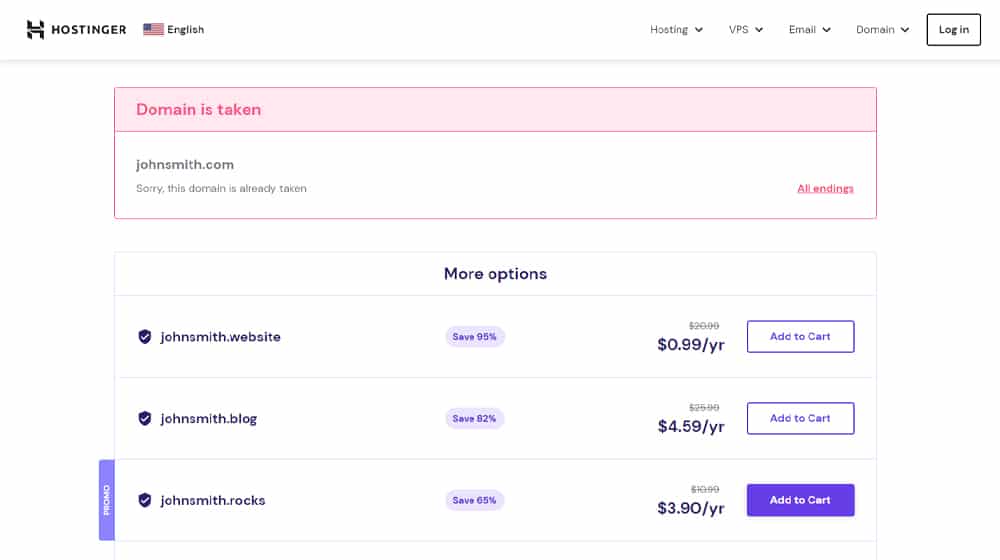How many top-level domains are there? Which one should you choose?
 The answer is more complex than you might imagine. Let's dig in!
The answer is more complex than you might imagine. Let's dig in!First, in case you're not sure what I'm even talking about today, what even is a top-level domain?
It's the domain extension after the dot in a URL. You're likely most familiar with the common handful, .com, .org, .edu, .gov, and .net. Some of the newer ones might have shown up on your radar as well, like .io.
What's the point of a TLD?
TLDs were originally designed as a way to categorize websites. Way back when the internet was much, much smaller, the idea was that you could look at the TLD and know what kind of site you were going to visit.

This is still true to a very limited extent:
On the other hand, some of it fell apart quickly. The .net TLD was for networks, the .org was for organizations, and do you know what .com was? It wasn't just "the default"; it was for Commercial sites.
 Fun fact: the very first TLD wasn't .com, .gov, or .org; in fact, it was .arpa. Originally, this was named after the Advanced Research Projects Agency, ARPA, which originally developed what evolved into the internet. Once the internet grew far beyond a government experiment, a backronym was created, and it now stands for Address and Routing Parameter Area. It's still in use as part of internet infrastructure, but you can't create a .arpa domain.
Fun fact: the very first TLD wasn't .com, .gov, or .org; in fact, it was .arpa. Originally, this was named after the Advanced Research Projects Agency, ARPA, which originally developed what evolved into the internet. Once the internet grew far beyond a government experiment, a backronym was created, and it now stands for Address and Routing Parameter Area. It's still in use as part of internet infrastructure, but you can't create a .arpa domain.Top-level domains can also have other meanings. There's a whole slate of country code domains, like .co.uk or .au, that are for use for those countries. Some countries make their registration open to anyone. For example, anyone can make a businessname.to domain, even though .to is the country code for the Kingdom of Tonga in Polynesia. Others, like .ad (for Andorra), require local citizenship, trademarks, or residency to access.
If you had to guess, how many top-level domains are there to choose from?
Thinking about your own personal use, you can probably name a dozen of them. You have ones I've already mentioned, like .com, .org, .net, .gov, .edu, and so on. You have a handful of country codes you encounter.
If you add some logic, you can probably recognize that there are 195 recognized countries in the world, and if each one has a country code TLD, there are at least 200 TLDs out there.
If you do a bit of Wikipedia diving, you could see that the article on Country Codes mentions that there are actually 308 designated country code TLDs.

All of that ignores things like .online, .shop, or .jaguar, all of which are valid TLDs these days. The agency responsible for controlling what is and isn't a viable TLD has introduced a lot of keyword TLDs, though very few of these are actually in widespread use.
So how many are there? Luckily, there's a real answer because that same agency, the Internet Assigned Numbers Authority, maintains a public list.
 The answer is, there are (as of this writing) One Thousand Four Hundred and Eighty One (1,481) different TLDs.
The answer is, there are (as of this writing) One Thousand Four Hundred and Eighty One (1,481) different TLDs.Now, some of these are extremely restricted or not available for public use at all. The previously-mentioned .arpa is an example. There are also TLDs for specific brands, like .yandex or .google. You can't very well go register a brand domain for a brand you aren't part of, so those can all be written off. There are also a bunch of domain extensions and other domains that aren't worth trying to use because they use special characters (or even emojis) and are mostly used in malicious attacks, so they put you at a disadvantage to using them. Speaking of, let's talk a bit more about that.
This is a pretty important question! How much does your TLD matter?
There are generally three reasons why your TLD is important.
The first reason is for branding and recognition. Businesses that get their own TLD, like Google, can benefit from this, but everyone else has to pick a TLD that people will understand and remember. There's a reason why you might only be able to identify a few dozen TLDs after thinking about it; the vast majority are either very regional or are not used.
Remember, many people think of ".com" as simply the default. It's so much the default, in fact, that web browsers often auto-complete to a .com name. You have to have something recognizable in a TLD to justify using something that isn't a .com.
Moreover, it's somewhere between bad form and a trademark violation to register a domain name with a different TLD from someone else's. If you were to try to use something like WordPress.io or WordPress.FM and make a business named "Word Press," you would likely run into trademark infringement from WordPress.
That's not to say these domains don't get registered. Sometimes they are by the brand itself. WordPress has:
On the other hand, some other TLDs have been registered and redirect to decidedly non-infringing businesses.
Critically, these are both redirects and the URL changes. They also don't even attempt to have branding anywhere close to that of WordPress and for good reason.

The second reason is for identification of purpose. Governmental agencies in the U.S. want to use a .gov TLD. Educational facilities want to use a .edu domain. These are regulated, and thus are authoritative, but more on that in a moment.
There are also purposeful TLDs that have escaped their original intent. The three biggest examples are ones I've already used: .io, .tv, and .fm. These are, respectively, for the British Indian Ocean Territory, the country of Tuvalu, and the Federated States of Micronesia.
However, all three of these have recognized that there's much, much more money to be made in using their common acronym usage than restricting it to country codes, so they're open. That's why you have .io (referencing I/O or Input/Output) for tech companies, .TV for television URLs and streaming-related services, and .FM for all things music and radio.
The third reason is for SEO and trust. Not all TLDs are created equal… sort of.
Several myths float around about the SEO of TLDs. The two most prominent are:
Neither of these is actually true. In fact, .com is one of the most-abused domains simply because it's the most common, but that doesn't mean all .com sites are starting off on the back foot. Likewise, a .gov site doesn't have a huge boost to SEO; it just has inherent authority by dint of its restricted usage.
SEO comes into play primarily just as another view of reason #1: people will default to thinking you have a .com domain unless you have something memorable, and the gimmick TLDs aren't going to benefit you. That, and because of the myth itself, if most people think .info and .biz sites are going to be spammy, even if your site is legit, people will have less confidence in it, even if Google doesn't care.
To answer this question, you have to go through a flowchart.
First: Are you a United States governmental institution or educational institution? If so, use .gov or .edu, respectively. These are limited access specifically for your kind of organization, so make use of them. Other examples include .mil for military organizations or .int for international treaties and other political dealings. If you're not able to use one of these restricted TLDs:
Are you based outside of the U.S. and restricted more or less to your country of origin? If so, use your country code if it's a major country code. British sites often use .co.uk, Australian sites use .au, New Zealand sites use .co.nz, and so on. This mostly just applies to brands that can't advertise outside of their countries (like local service providers) to help minimize exposure to non-relevant audiences. If you're not restricted to a specific country:

Is your blog or business about a specific industry with a common domain type? Think of the three I listed above, .tv, .fm, and .io. There are a handful of others out there as well. Consider who your competitors are and what niche they fill, and look at their TLDs. If they use one of these specific kinds of TLDs, it might be a good idea for you to use one, too, to fit in and meet the expectations of your potential audience. If your site doesn't fall under one of these banners (or if there's a TLD out there you could use, but it's uncommon):
Is your blog going to be about an organization, network, club, social group, non-profit, or other non-commercial purpose? Pick the appropriate choice between .net and .org. Usually, .org is for social and charitable organizations, and .net is for networking-related companies and organizations. If you don't meet these criteria:
Use .com.
That's pretty much it. 99% of the time, if you're starting a new blog, you're just going to want to default to a .com domain name if at all possible.
Say you came up with a strong brand name, but you go to check, and the .com domain name is already registered.

What can you do?
Usually, priority goes to .com because of that perception of it as the default TLD, and everything else is "settling for second best."
Honestly? Maybe yes. If your intended brand is something that may be common enough that someone might want to register a competing business under the same name, or you just want to protect your own brand name, registering all the common TLDs for it can be a good idea. You'll notice that a lot of big businesses register as many as they can and redirect them all to their core .com site. It's a way for those brands to protect themselves from phishing attacks on their customers, malware, and other issues.

If you don't anticipate running into those kinds of problems, or you have a very limited budget, just get your core .com and run with it. You can always register others later if they're available.
Do you have any other questions about TLDs? If so, feel free to ask!
We encourage you to share this article on Twitter and Facebook. Just click those two links - you'll see why.
It's important to share the news to spread the truth. Most people won't.